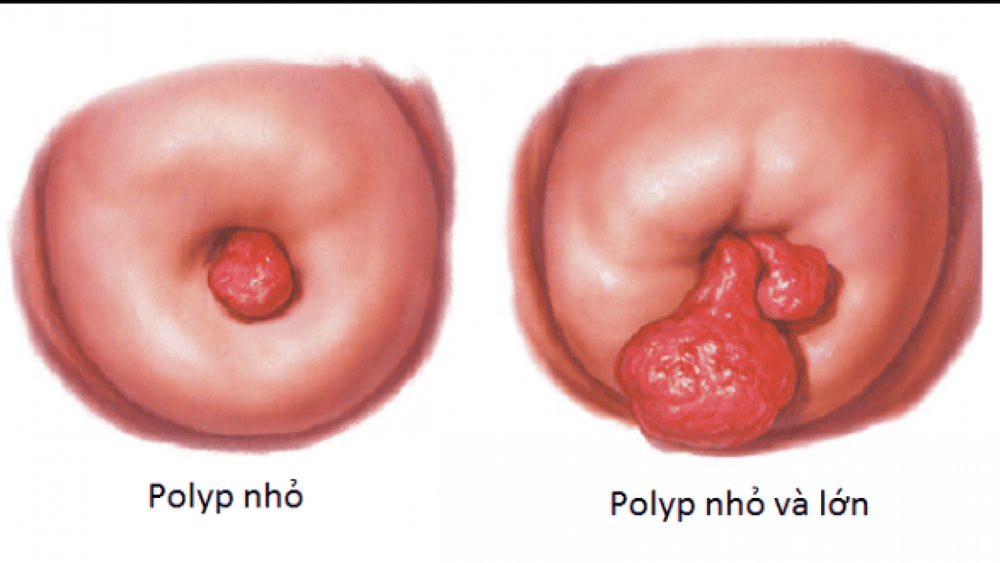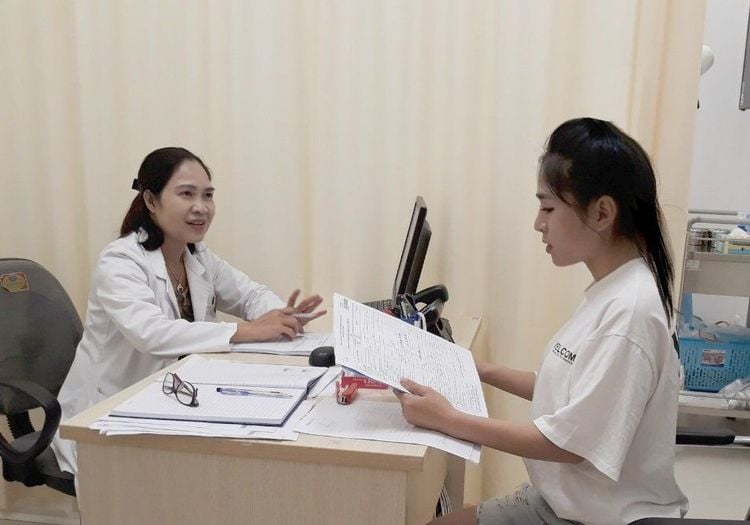Cervical polyps during pregnancy present significant risks to the health of both the mother and the baby. Therefore, pregnant women should have regular check-ups to detect and treat the condition early.
1. What is a cervical polyp?
The cervix is a narrow canal that connects the uterus to the vagina. It acts as a bridge linking the uterine cavity with the upper part of the vagina and provides a pathway for sperm to meet the egg for fertilization and pregnancy. During labor, the cervix thins and widens, creating a passage for the baby to move through the birth canal.
Cervical polyps are small, elongated growths that develop on the cervix. They are slender, elongated growths that originate from stalk-like attachments on the cervical surface or within the cervical canal.
Cervical polyps are common in women aged 40-50, pregnant women, and those who have given birth two or more times. They are rare in young girls who have not started menstruating.
Trắc nghiệm: Bạn có hiểu đúng về dấu hiệu mang thai sớm?
Các dấu hiệu mang thai sớm không phải chỉ mỗi trễ kinh mà còn có rất nhiều dấu hiệu khác như xuất huyết âm đạo, ngực căng tức,… Điểm xem bạn biết được bao nhiêu dấu hiệu mang thai sớm thông qua bài trắc nghiệm này nhé!
Cervical polyps are mostly benign tumors and rarely lead to cervical cancer. The HPV virus is the main cause of cervical cancer and is also responsible for genital warts.

2. What causes cervical polyps during pregnancy?
The main causes of cervical polyps include:
- Increased estrogen levels, a female sex hormone.
- High estrogen levels: Estrogen levels in women fluctuate throughout different stages of life, peaking during reproductive years.
- Chronic inflammation of the cervix, vagina, or uterus.
- Blocked blood vessels.
- Unsafe abortion performed at untrustworthy medical facilities, which can leave placental tissue in the uterus, increasing the risk of polyp formation.
3. Are cervical polyps during pregnancy dangerous?
Although cervical polyps are generally benign, they can cause pain, discomfort, and negatively affect the patient’s quality of life. During pregnancy, cervical polyps also pose potential risks to a woman’s health and fertility.
For small polyps that do not cause symptoms, doctors may recommend that pregnant women "live with" the condition without treatment. However, for larger polyps or those with a risk of progressing to cancer, doctors may intervene to protect the health of both the mother and the baby.
The severity of cervical polyps during pregnancy depends on various factors such as their location, size, and density.
3.1 How does it affect pregnant women?
Cervical polyps can cause increased vaginal discharge, raising the risk of gynecological infections in pregnant women.
In addition to impacting reproductive health, cervical polyps can also negatively affect the mental well-being of pregnant women. Constant feelings of worry and anxiety during pregnancy may harm the mother’s mental state, overall health, and the baby.
More seriously, if left untreated, cervical polyps can grow larger, potentially blocking the cervix. This can obstruct the baby’s passage during delivery, making natural birth difficult and requiring a cesarean section.
3.2 How does it affect the baby?
When the size or number of polyps increases, they can occupy more space in the uterus or cervix, causing pressure on the fetus and hindering its normal development. This raises the risk of fetal abnormalities, miscarriage, or preterm delivery.
Statistics show that the rate of miscarriage and preterm birth is significantly higher in pregnant women with cervical polyps compared to those without, especially in cases of assisted reproductive technologies (ART).
4. Treatment for pregnant women with cervical polyps
Symptoms of gynecological conditions often cause confusion and anxiety for women, especially pregnant women. Cervical polyps are one such condition that needs early treatment to avoid affecting the health of both the mother and the baby.
Doctors will recommend appropriate treatment methods for pregnant women:
- For pregnant women, surgical intervention is the preferred method to remove cervical polyps during pregnancy.
- Stalked polyps can be removed through electrocautery to minimize the risk of recurrence.
- Doctors limit the use of medications for pregnant women as they may affect the baby’s health.
For larger polyps, the doctor will carefully determine the appropriate timing and method to remove the polyp without harming the baby. Cervical polyps can cause prolonged bleeding during pregnancy, making monitoring and pregnancy care more difficult. If necessary, the doctor may remove the polyp vaginally when the baby has reached a safe gestational age.
It is essential for women to have regular gynecological check-ups to detect and treat conditions early. Before pregnancy, women should proactively undergo general health and gynecological examinations to ensure they are in the best possible condition for a healthy pregnancy and delivery.

Regular prenatal check-ups are extremely important during pregnancy to monitor the mother’s health and the baby’s development. This also help detect cervical polyps early, enabling timely medical intervention to avoid risks to both the mother and the baby.
To help clients detect and treat gynecological conditions early, Vinmec International General Hospital offers a Basic Gynecological Examination and Screening Package. This service helps women identify infections early, making treatment easier and more cost-effective. Additionally, it allows for the early detection of gynecological cancers (such as cervical cancer), even before symptoms appear.
The Basic Gynecological Examination and Screening Package is suitable for all women, regardless of age, especially those experiencing symptoms such as:
- Abnormal vaginal bleeding.
- Menstrual issues: unusually long cycles or irregular periods.
- Abnormal vaginal discharge (unusual odor or color).
- Pain or itching in the genital area.
Besides, the package is also recommended for women at risk, such as those with poor personal hygiene, unsafe sexual practices, or a history of unsafe abortions.
To arrange an appointment, please call HOTLINE or make your reservation directly HERE. You may also download the MyVinmec app to schedule appointments faster and manage your reservations more conveniently.














